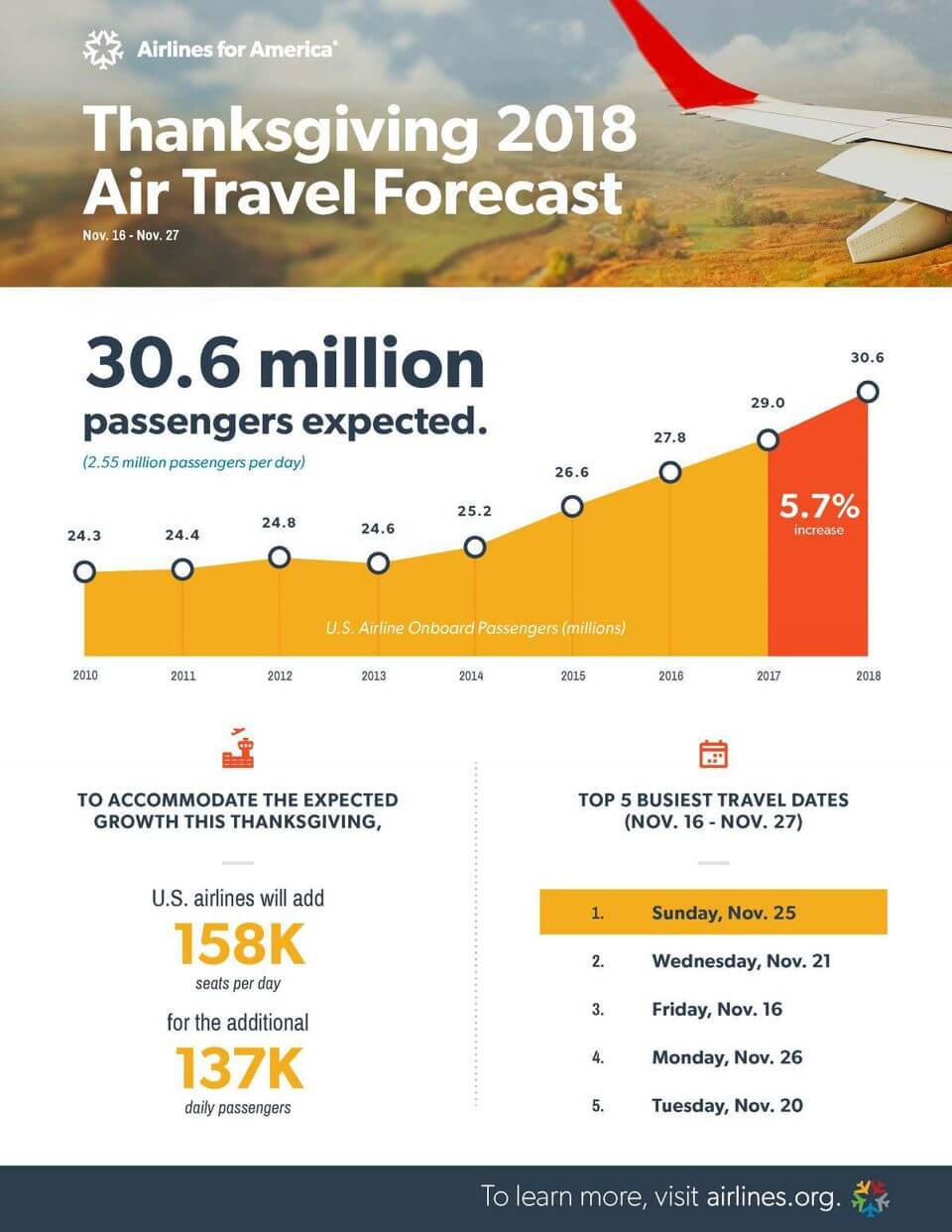
Thanksgiving has long been a family-centric holiday that features a picture-perfect feast against the chilly autumn backdrop. Over the years, Thanksgiving has changed, thanks to modern technology and capitalism. Many of us learned about the peaceful meal shared between Native Americans and early settlers, but that fairy tale history has hardly any meaning to the holiday now. Today (thanks to modern technology), data has transformed Thanksgiving socially and economically across multiple segments. In fact, holiday data is so strong that any of us can use it for insight.
Traveling
If you plan on traveling farther than a nearby neighborhood, you’ll definitely face intense traffic. Whether you’re in a plane, train, bus, or car, you won’t be alone.
 Thanksgiving is one of the busiest days for transportation services and major roads. The 2018 Thanksgiving weekend is expected to reach the highest travel rate from the last decade. What does this mean? Depending on when you choose to travel, your time, budget, and sanity will be more or less compromised. Looking to fly the day before Thanksgiving and go back home on Sunday? You’re looking at the two busiest travel dates for airplane passengers with nearly 3 million passengers per day, so prepare accordingly.
Thanksgiving is one of the busiest days for transportation services and major roads. The 2018 Thanksgiving weekend is expected to reach the highest travel rate from the last decade. What does this mean? Depending on when you choose to travel, your time, budget, and sanity will be more or less compromised. Looking to fly the day before Thanksgiving and go back home on Sunday? You’re looking at the two busiest travel dates for airplane passengers with nearly 3 million passengers per day, so prepare accordingly.
The dynamics of a turkey dinner
There’s more that goes into the iconic dinner than just cooking. This one dinner has data about everything from the turkey market to the political atmosphere. How are stores able to keep up with the ridiculous demand that only happens once a year? Data show that although turkey demand is high, the prices are lower than usual thanks to the demand curve. Farmers and wholesalers actually accumulate frozen turkeys leading up to November so stores can maintain lower prices and accommodate the demand. Once dinner is taken care of, you can interact with the company, right? Family holidays can be prone to disagreements and friction, something America has seen more of in the past few years. It’s no secret that our phones quietly collect and track our data and it’s telling us our opinions are creating tension. Data reveals politics is affecting time spent with family and guests actively choose to spend less time with family with opposing political views. But even if you get along with other guests, data says we’re constantly on our phones (which is only good for retailers).
Profits: Online and In Stores
Black Friday has been around for years but only recently became a mega-commercial holiday that’s only focused on sales. Retailers revel in the data that shows who to target and proves how successful their marketing campaigns are. And all have the same bottom line: profits. Will you be skipping dinner to camp outside of stores? Or waiting online with a cart full of deals, hoping the site doesn’t crash? In any case, November shopping is now heavily shaped by consumer data.
Companies know how to target their customer base because the data tells them. If you think Black Friday deals occur much earlier than they used to, you’re absolutely right. Data suggests retailers are too late with marketing campaigns during the actual holiday as consumer interest appears to peak one month prior. Sellers opt to target ads on customers who buy leading up to the holiday, rather than last minute shoppers because of profitability. And though Thanksgiving is an American holiday, Black Friday is spreading around the world as businesses try to maximize the profits overseas. South Africa currently has the highest growth of Black Friday business, attracting corporate gazes and local customers. As companies track our behavior through tech, they gain more insight into our buying behavior.
 Customers are dead set on grabbing up the best deals, but for store and warehouse employees, it’s an awful mess that takes away from what should be a restful holiday. Between Black Friday violence in stores and the human cost of online shopping, employees suffer for the sake of a good deal. Some of those deals may not even be deals as some businesses use shady tactics to make you think you’re getting a deal when in reality you’re just lining their pockets. But the deals don’t stop on Friday. Cyber Monday is the newest addition to the Thanksgiving season, growing in sales and revenue every year (2018 sales projected to beat last year’s by 16%). Still, to corporations and stakeholders, consumer data is the most valuable asset (and profits).
Customers are dead set on grabbing up the best deals, but for store and warehouse employees, it’s an awful mess that takes away from what should be a restful holiday. Between Black Friday violence in stores and the human cost of online shopping, employees suffer for the sake of a good deal. Some of those deals may not even be deals as some businesses use shady tactics to make you think you’re getting a deal when in reality you’re just lining their pockets. But the deals don’t stop on Friday. Cyber Monday is the newest addition to the Thanksgiving season, growing in sales and revenue every year (2018 sales projected to beat last year’s by 16%). Still, to corporations and stakeholders, consumer data is the most valuable asset (and profits).
Happy Thanksgiving
These data insights are just the tip of the iceberg and Thanksgiving is hardly the only holiday to change through data. Keep data in mind when you’re celebrating this year and maybe you can make it work to your advantage.
